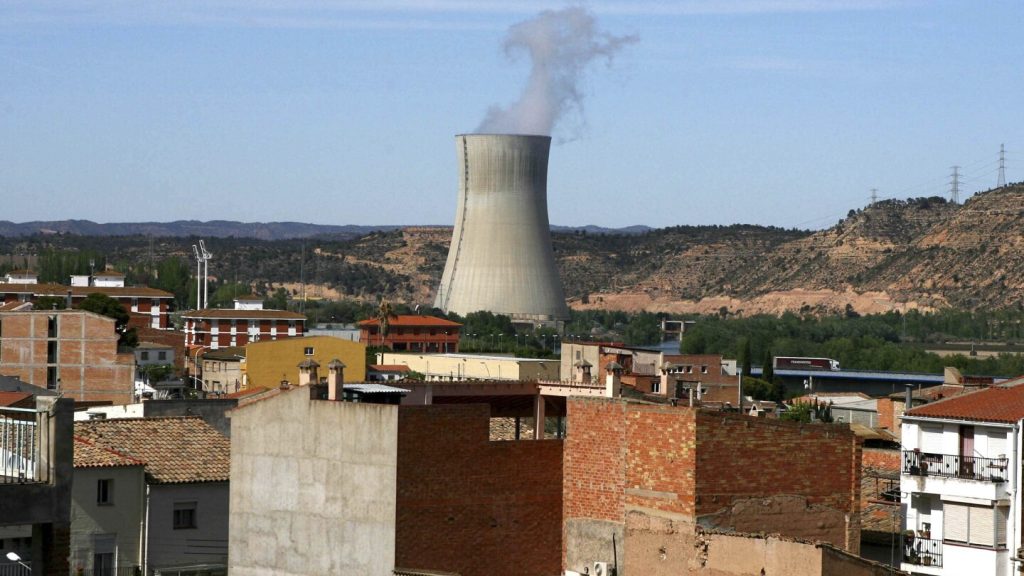MADRID (AP) — The massive power outage that hit the Iberian peninsula on April 28 has reignited a debate in Spain over the country’s plan to phase out its nuclear reactors as it generates more power with renewable energy.
As people wait for answers about what caused the historic power cut, which abruptly disrupted tens of millions of lives, some are questioning the wisdom of decommissioning nuclear reactors that provide a stable, if controversial, form of energy compared to renewables, whose output can be intermittent.
Spanish Prime Minister Pedro Sánchez has rejected such criticism, asking for patience while the government investigates what caused the grid’s disconnection. He said that his government would not “deviate a single millimeter” from its energy transition plans.
Here’s what to know about the energy debate:
What is nuclear power and why is it controversial?
Nuclear power is a zero-carbon energy source formed from nuclear fission, when the nuclei of atoms are split into two or several parts, releasing energy.
It accounts for about 10% of electricity generation worldwide, according to the International Energy Association.
Many countries consider nuclear power critical to reaching their net-zero goals. But while nuclear reactors do not emit planet-warming greenhouse gases like gas- or coal-fired power plants, they produce radioactive waste that even advanced economies have struggled to dispose.
Why does Spain want to decommission its nuclear reactors?
Spain generated nearly 57% of its electricity in 2024 from renewable energy sources like wind, hydropower and solar, according to Red Eléctrica, the country’s grid operator. About 20% came from nuclear power plants.
In 2019, Sánchez’s government approved a plan to decommission the country’s remaining nuclear reactors between 2027 and 2035 as it expands its share of renewable energy even further. The country aims to generate 81% of its electricity by 2030 from renewable sources.
Sánchez on Wednesday said that the four nuclear facilities that were online the day of the blackout did not help re-power the grid.
Batteries and other methods help regulate changes in electricity supply from wind and solar.
Why is Spain’s renewables push being questioned now?
While the cause of the sudden outage on April 28 is still unknown, the event has raised questions about the technical challenges facing electricity grids running on high levels of solar and wind.
Solar and wind provided roughly 70% of the electricity on the grid moments before Spain lost 15 gigawatts of electricity — about 60% of its supply — in just five seconds.
Electricity grids were designed for a different era, according to Gilles Thonet, deputy secretary general of the International Electrotechnical Commission, an industry group.
“Traditionally, power flowed in one direction: from large coal, gas or nuclear plants to homes and businesses,” Thonet said. “These plants provided not only electricity, but also stability. Their spinning turbines acted like shock absorbers, smoothing out fluctuations in supply and demand.”
In the days following the blackout, Google searches in Spain for “nuclear” spiked, according to data from Google Trends.
Spain’s nuclear lobby group Foro Nuclear said this week that the government should rethink its plan to decommission its nuclear reactors after the outage. Ignacio Araluce, its president, said the nuclear plants online before the outage “provide firmness and stability.”
Would more nuclear power have prevented a blackout?
Others say it is too soon to draw conclusions about what role nuclear energy should play.
“We do not know the cause of the oscillations,” said Pedro Fresco, director general of Avaesen, an association of renewable energy and clean technology firms in Valencia. “Therefore, we do not know what would have allowed them to be controlled.”
Spain’s grid operator last week narrowed down the source of the outage to two separate incidents in which substations in southwestern Spain failed.
Environment Minister Sara Aagesen said earlier this week that the grid had initially withstood another power generation outage in southern Spain 19 seconds before the blackout.
Sánchez in his speech to Parliament said there was “no empirical evidence” to show that more nuclear power on the grid could have prevented a blackout or allowed the country to get back online faster. In fact, the four nuclear facilities online on April 28 before the blackout were taken offline after the outage as part of emergency protocol to avoid overheating.
He said that nuclear energy “has not been shown to be an effective solution in situations like what we experienced on April 28,” and called the debate surrounding his government’s nuclear phase-out plan “a gigantic manipulation.”
Gas and hydropower, as well as electricity transfers from Morocco and France, were used to get the country’s grid back online.


